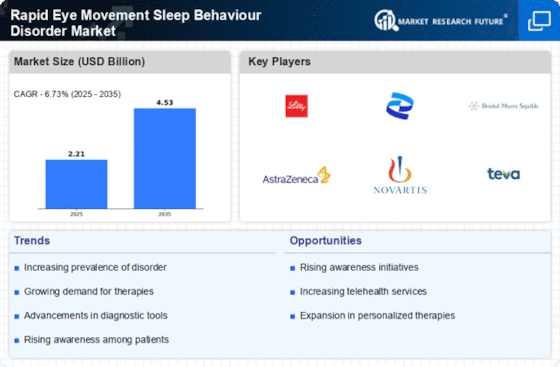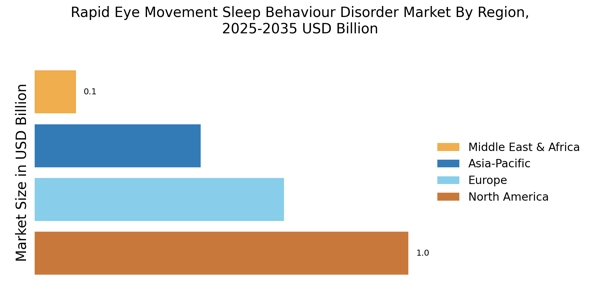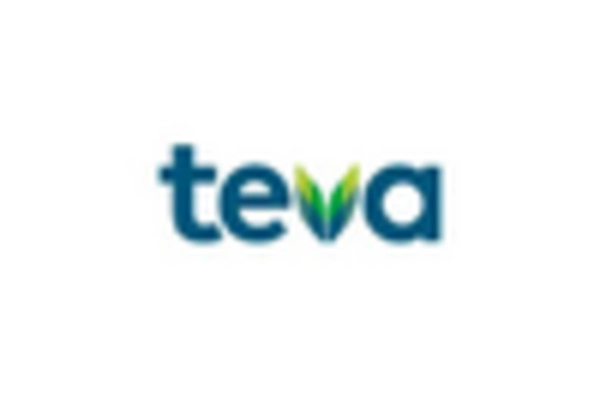Rising Geriatric Population
The increasing geriatric population is a crucial factor impacting the Rapid Eye Movement Sleep Behaviour Disorder Market. As individuals age, the likelihood of developing sleep disorders, including RBD, tends to rise. The World Health Organization projects that the number of people aged 60 years and older will double by 2050, which may lead to a corresponding increase in RBD cases. This demographic shift is likely to create a heightened demand for specialized care and treatment options tailored to older adults. Consequently, healthcare systems may need to adapt to accommodate this growing patient population, thereby driving market growth and encouraging the development of age-appropriate therapies.
Advancements in Diagnostic Technologies
Technological innovations in the diagnosis of Rapid Eye Movement Sleep Behaviour Disorder Market are likely to enhance the Rapid Eye Movement Sleep Behaviour Disorder Market. The development of advanced polysomnography techniques and wearable sleep monitoring devices has improved the accuracy of RBD diagnosis. These advancements facilitate earlier detection and intervention, which may lead to better patient outcomes. As diagnostic tools become more accessible and user-friendly, healthcare professionals are expected to adopt these technologies more widely. This trend could potentially increase the number of diagnosed cases, thereby driving market growth. Furthermore, the integration of artificial intelligence in sleep studies may provide deeper insights into sleep patterns, further propelling the market forward.
Growing Research and Development Activities
The surge in research and development activities focused on Rapid Eye Movement Sleep Behaviour Disorder Market is poised to influence the Rapid Eye Movement Sleep Behaviour Disorder Market positively. Increased funding from both public and private sectors for RBD research is likely to yield new therapeutic options and treatment protocols. Clinical trials exploring novel pharmacological agents and behavioral therapies are underway, which may lead to breakthroughs in managing this disorder. As new findings emerge, they could reshape treatment paradigms and enhance the understanding of RBD. This influx of research may not only improve patient care but also attract investment into the market, fostering further innovation and expansion.
Increased Prevalence of REM Sleep Disorders
The rising incidence of Rapid Eye Movement Sleep Behaviour Disorder Market (RBD) appears to be a significant driver for the Rapid Eye Movement Sleep Behaviour Disorder Market. Studies indicate that RBD affects approximately 0.5 to 2% of the general population, with higher prevalence in older adults. This increase in diagnosed cases is likely to stimulate demand for effective treatment options, thereby expanding the market. As awareness grows, healthcare providers are more frequently identifying RBD, which may lead to a surge in patient referrals to specialists. Consequently, the market could experience substantial growth as more individuals seek interventions for this disorder, highlighting the need for innovative therapies and management strategies.
Enhanced Focus on Mental Health and Sleep Disorders
The growing emphasis on mental health and its connection to sleep disorders is likely to shape the Rapid Eye Movement Sleep Behaviour Disorder Market. Increased public awareness regarding the importance of sleep health has led to a greater understanding of conditions like RBD. Mental health professionals are increasingly recognizing the interplay between sleep disorders and psychological well-being, which may lead to more comprehensive treatment approaches. This trend could result in a higher number of patients seeking help for sleep-related issues, including RBD. As mental health initiatives gain traction, the market may experience growth driven by the integration of sleep disorder management into broader mental health care strategies.

















